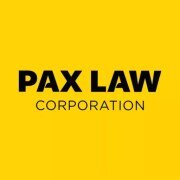Best Restructuring & Insolvency Lawyers in North Vancouver
Share your needs with us, get contacted by law firms.
Free. Takes 2 min.
List of the best lawyers in North Vancouver, Canada
About Restructuring & Insolvency Law in North Vancouver, Canada
Restructuring and insolvency law in North Vancouver, British Columbia, is designed to provide solutions for individuals and businesses experiencing financial hardship. These legal frameworks help debtors and creditors resolve financial difficulties, whether through structured repayment agreements, corporate reorganizations, or formal insolvency proceedings like bankruptcy. North Vancouver residents and local businesses have access to a range of legal protections, options for debt relief, and guidance about satisfying their obligations under local and federal Canadian laws.
Why You May Need a Lawyer
Navigating restructuring and insolvency issues involves complex legal and financial considerations. You may require a lawyer in situations such as:
- When facing mounting debts you cannot manage on your own.
- Receiving collection notices, court actions, or threats of repossession.
- Owning a business that is unable to meet its financial commitments.
- Dealing with restructuring corporate or personal finances while protecting key assets.
- Needing to understand your rights and obligations as a creditor.
- Drafting and negotiating proposals to creditors.
- Considering bankruptcy as a last resort.
- Wanting to avoid mistakes that could worsen your financial situation.
A lawyer can help you understand which legal processes best suit your situation, represent your interests in negotiations or court proceedings, and ensure compliance with all applicable laws.
Local Laws Overview
Restructuring and insolvency matters in North Vancouver are governed primarily by federal statutes, including the Bankruptcy and Insolvency Act (BIA) and the Companies' Creditors Arrangement Act (CCAA), with some aspects falling under British Columbia provincial laws. Key aspects relevant to North Vancouver include:
- Bankruptcy: A formal legal process where an individual or business, unable to pay debts, may obtain relief from most debts. Bankruptcy is federally regulated but administered locally.
- Consumer Proposals: An alternative to bankruptcy allowing individuals to negotiate repayment terms with creditors.
- Corporate Restructuring: Businesses in financial distress may use the CCAA or Division I Proposals under the BIA to restructure and avoid bankruptcy.
- Provincial Court Involvement: The Supreme Court of British Columbia handles most insolvency proceedings within North Vancouver.
- Lien and Priority Rules: Laws governing creditor priorities and secured interests apply to local assets and businesses.
All these processes are closely regulated to protect both debtors and creditors while enabling fair and structured resolution of debts.
Frequently Asked Questions
What is the difference between bankruptcy and insolvency?
Insolvency means you cannot meet your financial obligations as they become due. Bankruptcy is a formal legal process you may enter when you are insolvent, providing debt relief and requiring the surrender of non-exempt assets.
How do I know if I should file for bankruptcy or a consumer proposal?
A consumer proposal may be suitable if you have regular income and wish to avoid bankruptcy by negotiating easier repayment terms with creditors. Bankruptcy may be a last resort if you cannot repay debts. A lawyer or licensed insolvency trustee can help you assess your options.
Can I keep my house or car if I go bankrupt in North Vancouver?
Certain assets may be exempt from seizure, including portions of equity in your home and a basic vehicle, under provincial law. The exact exemptions depend on current British Columbia exemption rules.
Do I need a lawyer, or can I use a licensed insolvency trustee?
A licensed insolvency trustee (LIT) administers bankruptcies and proposals, but a lawyer can provide independent legal advice, especially where there are disputes, complex assets, or potential legal actions.
Will bankruptcy affect my credit rating?
Yes, bankruptcy will have a significant negative impact on your credit rating and will remain on your credit bureau report for several years after discharge.
Can my creditors garnish my wages in North Vancouver?
Creditors can obtain a court order to garnish your wages if you have unpaid debts. Filing a bankruptcy or formal proposal provides a legal stay of proceedings to prevent further wage garnishment.
How does corporate restructuring work for businesses?
Corporate restructuring may be achieved through debtor-in-possession arrangements under the CCAA or by making a proposal to creditors under the BIA. This allows businesses to continue operating while negotiating with creditors.
How long does the bankruptcy process take?
A first-time personal bankruptcy in Canada typically lasts nine months but may be longer if you have surplus income or prior bankruptcies.
What debts are not discharged in bankruptcy?
Certain debts cannot be discharged, including child and spousal support, court fines, debts from fraud or misrepresentation, and student loans less than seven years old.
Are restructuring and insolvency proceedings public?
Yes, most insolvency processes are a matter of public record, but the level of disclosure varies. Your lawyer or trustee can explain what information will be accessible.
Additional Resources
If you are seeking more information or assistance regarding restructuring and insolvency in North Vancouver, consider contacting the following organizations:
- Licensed Insolvency Trustees in your area
- Supreme Court of British Columbia for legal information
- Office of the Superintendent of Bankruptcy Canada
- British Columbia Financial Consumer Agency
- Access Pro Bono BC for free or low-cost legal assistance
- Canadian Bar Association British Columbia Branch
Next Steps
If you believe you need legal assistance with a restructuring or insolvency matter in North Vancouver, begin by gathering your financial documents, including a list of debts, assets, and income details. Consider scheduling a consultation with a lawyer specializing in insolvency law, or reach out to a licensed insolvency trustee to discuss available options. Acting early can help you understand your rights, prevent further financial harm, and find the most suitable solution for your circumstances.
Take proactive steps by asking questions and ensuring your interests are represented throughout the process. Professional legal guidance can make a significant difference in achieving a positive outcome and moving towards financial stability.
Lawzana helps you find the best lawyers and law firms in North Vancouver through a curated and pre-screened list of qualified legal professionals. Our platform offers rankings and detailed profiles of attorneys and law firms, allowing you to compare based on practice areas, including Restructuring & Insolvency, experience, and client feedback.
Each profile includes a description of the firm's areas of practice, client reviews, team members and partners, year of establishment, spoken languages, office locations, contact information, social media presence, and any published articles or resources. Most firms on our platform speak English and are experienced in both local and international legal matters.
Get a quote from top-rated law firms in North Vancouver, Canada — quickly, securely, and without unnecessary hassle.
Disclaimer:
The information provided on this page is for general informational purposes only and does not constitute legal advice. While we strive to ensure the accuracy and relevance of the content, legal information may change over time, and interpretations of the law can vary. You should always consult with a qualified legal professional for advice specific to your situation.
We disclaim all liability for actions taken or not taken based on the content of this page. If you believe any information is incorrect or outdated, please contact us, and we will review and update it where appropriate.









